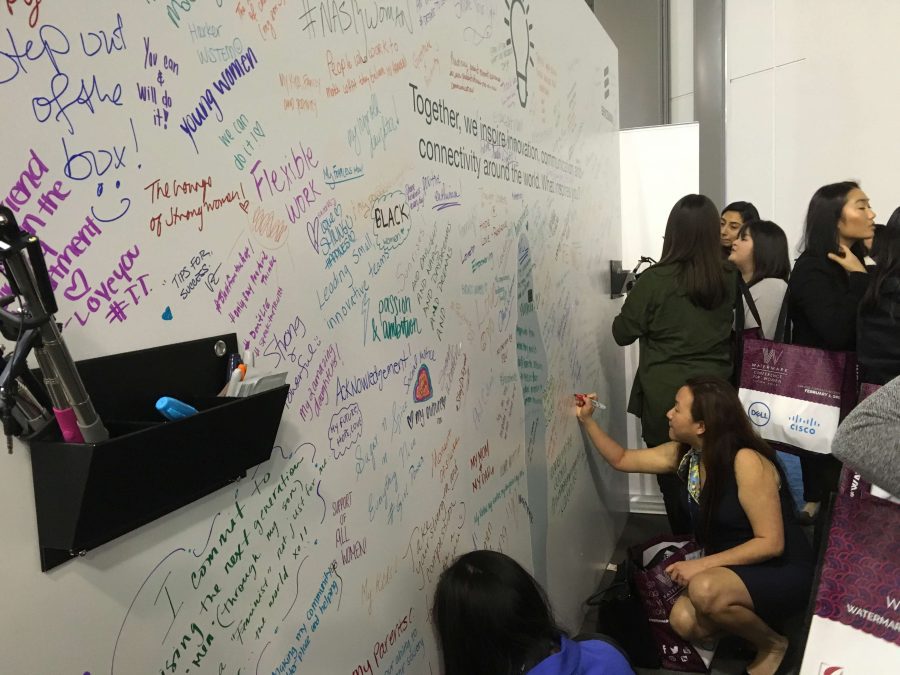Stripping ‘quiet’ of its negative connotations
Watermark Conference attendees write about what inspires them in their community.
March 17, 2017
One person at a table near the front rises to her feet, and the room follows. The applause is thunderously loud, almost deafening, as claps and cheers intermingle in the massive conference hall. Viola Davis smiles at the front of the room, her deeply personal keynote speech having moved many in the room to tears.
It was well over a week ago and I’m still giddy over the fact that I was in the same building as and heard speeches from Sheryl Sandberg, Viola Davis, Condoleeza Rice and Madeleine Albright.
Admittedly, it was for only half an hour apiece, I was on the opposite side of that truly massive hall, there were 6,000 others in attendance, and, even squinting with glasses on, I could only discern their vague outlines in the distance.
Their presence and their speeches still amazed me, though, and much more than when I said hi to Kevin Jonas at Disneyland nearly a decade ago, my previous claim to ever meeting fame.
After the initial high died down, though, what stuck in my mind more than any of the admittedly truly inspirational keynote speeches was the message reiterated by the breakout session speakers, by the women manning the company booths and by seemingly everyone everywhere.
They all wanted to talk about speaking up, speaking out, the extrovert-introvert divide and how introversion doesn’t equate to shyness. I agree fully with that latter sentiment because for all that I’m an introvert, I’m not terribly shy, and most of the introverts I know aren’t either. In reinforcing the disparate natures of introversion and shyness, however, many a speaker from the conference synonymized shyness and quietness and then condemned them both in a way that didn’t sit right with me.
I know the importance and value of speaking up and voicing your ideas and opinions, but I don’t think being quiet, or even being shy, is necessarily an opposing characteristic.
I’m quiet. I don’t like saying it, even though I know it’s objectively true, because it has a fairly negative connotation. Quiet implies I’m a pushover, that I never speak up, that I don’t have anything impactful to say or that I don’t care enough to say it.
Sure, I don’t talk as much as other people, especially in public settings (and yes, I do see the irony of writing that in a newspaper printed for the entire campus), but I do speak when I want to and when I have to. Trust me, if I really want to say something, I do. I participate in classes and crack bad jokes until my friends groan and rant to whoever I’m talking to about whatever is on my mind. I talk plenty, but my innate tendency to stay on the quieter side — whether it be in the volume of my voice or the lengthiness of my speech — is not an undesirable characteristic.
It’s personality trait, just like any other, and not an inherently bad one, as much as people like to label it as so. To me, it just means that more often than not, you do what you do with a little less noise.
And when I’m not talking, most of the time––and here I’m talking about informal social situations––, it’s because I’m genuinely fine with just listening and because I don’t feel a burning need to say anything at all.
So here’s a shoutout to all the quiet people: your personality isn’t inferior or undesirable. It makes you work a little more outside your comfort zone, but that doesn’t mean you have to change anything. Often, you can’t, and I know I definitely wouldn’t want to. It’s your story, and as Viola Davis once advised me and a few thousand of my favorite conference attendees, “own your story.”
This piece was originally published in the pages of The Winged Post on February 21, 2017.




![LALC Vice President of External Affairs Raeanne Li (11) explains the International Phonetic Alphabet to attendees. "We decided to have more fun topics this year instead of just talking about the same things every year so our older members can also [enjoy],” Raeanne said.](https://harkeraquila.com/wp-content/uploads/2025/10/DSC_4627-1200x795.jpg)


















![“[Building nerf blasters] became this outlet of creativity for me that hasn't been matched by anything else. The process [of] making a build complete to your desire is such a painstakingly difficult process, but I've had to learn from [the skills needed from] soldering to proper painting. There's so many different options for everything, if you think about it, it exists. The best part is [that] if it doesn't exist, you can build it yourself," Ishaan Parate said.](https://harkeraquila.com/wp-content/uploads/2022/08/DSC_8149-900x604.jpg)




![“When I came into high school, I was ready to be a follower. But DECA was a game changer for me. It helped me overcome my fear of public speaking, and it's played such a major role in who I've become today. To be able to successfully lead a chapter of 150 students, an officer team and be one of the upperclassmen I once really admired is something I'm [really] proud of,” Anvitha Tummala ('21) said.](https://harkeraquila.com/wp-content/uploads/2021/07/Screen-Shot-2021-07-25-at-9.50.05-AM-900x594.png)







![“I think getting up in the morning and having a sense of purpose [is exciting]. I think without a certain amount of drive, life is kind of obsolete and mundane, and I think having that every single day is what makes each day unique and kind of makes life exciting,” Neymika Jain (12) said.](https://harkeraquila.com/wp-content/uploads/2017/06/Screen-Shot-2017-06-03-at-4.54.16-PM.png)








![“My slogan is ‘slow feet, don’t eat, and I’m hungry.’ You need to run fast to get where you are–you aren't going to get those championships if you aren't fast,” Angel Cervantes (12) said. “I want to do well in school on my tests and in track and win championships for my team. I live by that, [and] I can do that anywhere: in the classroom or on the field.”](https://harkeraquila.com/wp-content/uploads/2018/06/DSC5146-900x601.jpg)
![“[Volleyball has] taught me how to fall correctly, and another thing it taught is that you don’t have to be the best at something to be good at it. If you just hit the ball in a smart way, then it still scores points and you’re good at it. You could be a background player and still make a much bigger impact on the team than you would think,” Anya Gert (’20) said.](https://harkeraquila.com/wp-content/uploads/2020/06/AnnaGert_JinTuan_HoHPhotoEdited-600x900.jpeg)

![“I'm not nearly there yet, but [my confidence has] definitely been getting better since I was pretty shy and timid coming into Harker my freshman year. I know that there's a lot of people that are really confident in what they do, and I really admire them. Everyone's so driven and that has really pushed me to kind of try to find my own place in high school and be more confident,” Alyssa Huang (’20) said.](https://harkeraquila.com/wp-content/uploads/2020/06/AlyssaHuang_EmilyChen_HoHPhoto-900x749.jpeg)











